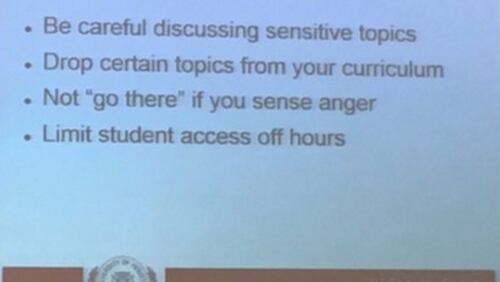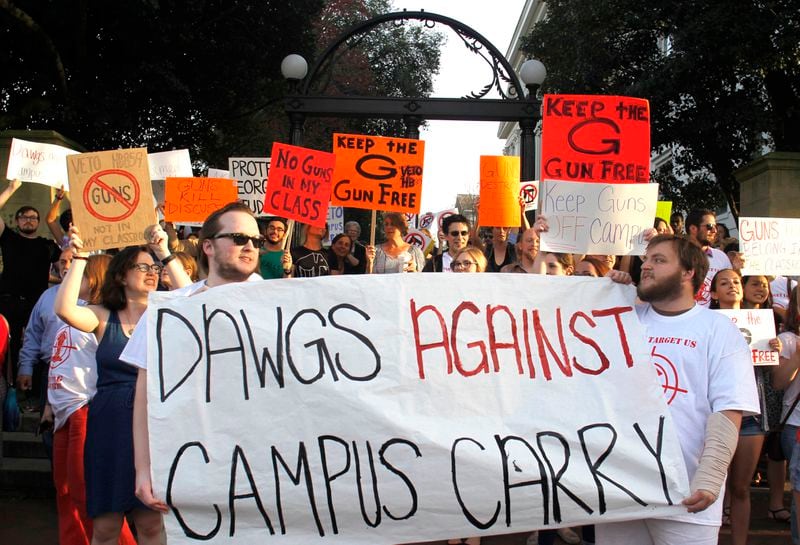With students and faculty waiting to see if Gov. Nathan Deal will veto the legalization of guns on public college campuses, University of Georgia professor Peter Smagorinsky explains why campus carry is a bad idea.
He raises an issue brought up by female lawmakers during the debate over House Bill 859 -- the risks to young women from armed men on campus. (The argument from women legislators that legalizing guns would increase violence against women was ignored.)
Smagorinsky also cites the violence at Trump rallies as evidence we are now living in incendiary times that heighten the threat level from guns on campus.
By Peter Smagorinsky
"He deserved it. The next time we see him, we might have to kill him. We don't know who he is. He might be with a terrorist organization," John McGraw, who suckerpunched a protester being escorted from a Donald Trump rally.
His hardball tactics, Erik Erickson said, have spurred death threats from fervent Trump backers. He's got full-time bodyguards outside his Middle Georgia home. AJC news story
Welcome to the context in which Georgia lawmakers are considering the adoption of “open carry” laws that allow one and all to be armed at our institutions of higher learning. The pros and cons of this legislation have been well-aired by this point, typically along ideological lines, and I won’t review them all here.
Rather, I’ll look at the environment in which this law is being considered, and ask if it will increase or decrease campus safety, which is the issue at stake. The assumption behind the pro-open-carry law is that bad guys with guns will avoid places loaded with good guys with guns. The assumption behind this assumption is that the good guys are easy to distinguish from the bad guys.
About that, I’m not so sure.
House Bill 859's purpose is to reduce crime on campus, a problem that may or may not exist. Gun advocates claim that open carry laws reduce crime, but critics question the manipulation of statistics to support that contention. So there may or may not be a problem, and this solution may or may not work.
Let’s visit the University of Houston, where the caution leading off this essay has been developed as part of a set of guidelines for professors in their new open-carry environment. The message: Play it safe, lest a student murder you.
Over in Austin, Professor Daniel Hamermesh of the University of Texas said he feared "a disgruntled student with a gun would 'lose it,' pull out the gun and shoot the instructor. With 500 students in my [economics] class, this did not seem impossible." He is among several who has already resigned or declined job offers due to concerns that, rather than becoming safer, campuses would become dangerous, as the sword becomes mightier than the pen.
Credit: Maureen Downey
Credit: Maureen Downey
Now, personally, I don’t fear being murdered by my students. Over my 26 years in higher education, I’ve had some who didn’t like me, many whose politics departed from my own, and a few who were definitely unbalanced. But I’ve never feared death going to campus for meetings, classes, and other duties.
I’m also a 6’-5”, 230 pound man who works out. Most people looking for trouble find someone smaller to mess with.
Personally, I’ve spent little time around guns. My dad was a weather forecaster whose mind was in the clouds, not the streets. My mom was a statistician for the Weather Bureau who raised five kids to use our words, not our fists, and certainly not our guns, to resolve disputes.
But I’ve lived in Oklahoma and Georgia for nearly three decades and have become comfortable with the idea that guns are part of some families’ lives. I’ve occasionally been comforted to live around a neighbor with a rifle, such as when we had coyotes in my neighborhood in Athens. My pets rested easier, too.
I also have students who are registered gun owners, and should mention that as a literacy educator, I have classes mostly filled with women. Some keep them at home for protection. In a recent discussion about open carry with my undergraduates, several said they have felt threatened on campus and would carry a gun if allowed, while others said they would not.
What came out of the discussion, though, was not that they felt endangered on campus by terrorists, or thieves, or single shooters out for retribution against the world with random violence. No, what scared them into wanting protection is creepy men who stalk them and threaten them with sexual assault. Some carry mace, but sexual predators need a lot of discouragement, and as people of age with proper training, they felt that carrying a gun would keep themselves safe.
Some professors may reasonably fear being shot by their students, and I’m sure they have their reasons. I see a bigger danger in society at large, however, which is the rising feeling of anger among those who support the Trump presidency, to the point where even an arch-conservative like Erik Erickson must hire protection because he opposes Trump’s candidacy.
Trump supporters appear to feel very comfortable explaining that protesters to his rallies are targets for murder; and McGraw’s response has drawn widespread praise from others who share his politics. To many, these are the “good guys” protecting us from “bad guys,” armed or not, who threaten their beliefs. These incidents are not isolated, but have become pervasive at Trump rallies and beyond, celebrated by the candidate himself.
In this environment I am concerned that violence has become a reasonable way to stifle opposing perspectives, with torture emphasized by the candidate himself as an essential means of fighting terror. People who are amped up by a charismatic leader over time have done some dastardly things to exercise their passions. These people scare me a lot more than the sort of terrorists that open-carry advocates believe to be the problem.
If state legislators wish to make campuses safer, I suggest they listen to my students and understand how vulnerable women feel to predatory men. Three-fourths of the Georgia Legislature is made up of men, and women consistently tell me that men have no idea of the daily abuse that they take from men’s hands.
That’s a real problem, not one of speculation. If campus safety is an issue, and if most women feel unsafe — not from terrorists, but from macho men imposing their will on them — then we have a real problem in search of real solutions.
Is open carry the solution? Personally, I’d prefer rigorous training of incoming male students in being respectful toward women and standing up for those who report abuse, providing mace to women as part of their enrollment, expanding security cameras, examining the link between alcohol and violence toward women, and taking other measures. The proposed approach of “open carry” seems to be the wrong solution to the wrong problem.
About the Author








